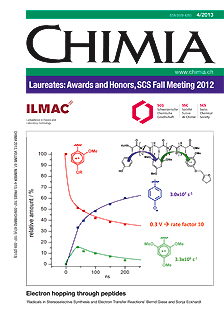Methane Catalytic Combustion on Pd9/?-Al2O3 with Different Degrees of Pd Oxidation
DOI:
https://doi.org/10.2533/chimia.2013.271Keywords:
Alumina support, Dft, Metal-support interactions, Methane combustion, Palladium catalystAbstract
: This research is focused on the analysis of adsorbed CH4 intermediates at oxidized Pd9 nanoparticles supported on ? -alumina. From first-principle density functional theory (DFT) calculations, several configurations, charge transfer and electronic density of states have been analyzed in order to determine feasible paths for the oxidation process. Furthermore methane oxidation cycles have been investigated on Pd nanoparticles with different degrees of oxidation. In case of low oxidized Pd nanoparticles, activation of methane is observed, whereby hydrogen from methane is adsorbed at one oxygen atom. This reaction is exothermic. In a subsequent step, two water molecules desorb. Additionally, a very interesting structural effect becomes evident; Pd-carbide formation, which is also an exothermic reaction. Furthermore, oxidation of such carbidized Pd-nanoparticles leads to CO2 formation, which is an endothermic reaction. One important result is that the support is involved in the CO2 formation. A different mechanism of methane oxidation was discovered for highly oxidized Pd nanoparticles. When the Pd nanoparticle is more strongly exposed to oxidative conditions, adsorption of methane is also possible, but it leads to carbonic acid production at the interface between the Pd nanoparticles and support. This process is endothermic.Downloads
Published
2013-04-24
Issue
Section
Scientific Articles
License
Copyright (c) 2013 Swiss Chemical Society

This work is licensed under a Creative Commons Attribution-NonCommercial 4.0 International License.
How to Cite
[1]
I. Czekaj, K. A. Kacprzak, J. Mantzaras, Chimia 2013, 67, 271, DOI: 10.2533/chimia.2013.271.







